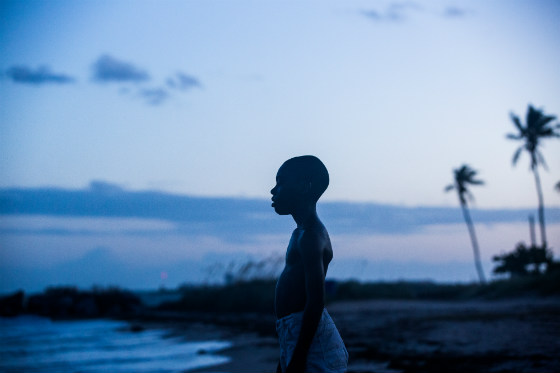Moonlight

Photo: David Bornfriend.
There’s a scene in the first act of Barry Jenkins’ MOONLIGHT in which the young Chiron (Alex Hibbert) asks his surrogate father, Juan (Mahershala Ali), two questions: Is his mother on drugs and does Juan sell them to her. In that moment, Chiron looks to Juan’s girlfriend, Teresa (Janelle Monáe), to keep him honest. After Juan cops to it, the fragile, taciturn boy whose detractors have nicknamed “Little”, leaves. Juan breaks down into tears of guilt; he failed Little.
Adapted from Tarell McRaney’s semi-autobiographical play, In Moonlight Black Boys Look Blue, we are gifted a unique look into the life of a youth grappling with his burgeoning sexual identity. “What’s a faggot?” he asks Juan. Juan replies that it’s a word used to slander gay people.
MOONLIGHT is structured classically as a three act play: Little. Chiron. Black. Chiron by birth, his friend Kevin nicknames him Black—the significance is never revealed but it does fit the internalization of Chiron’s emotions. Between the bullies at school and the bully of a crack-addicted mother at home, Paula (Naomie Harris), Little avoids conversation, except with Kevin and Teresa.
In the second act, Chiron (Ashton Sanders) continues to struggle with concentrating in class while others bully him, particularly a much larger boy, Terrel (Patrick Decile). Without spoiling this pivotal middle chapter, I call your attention to the next morning. Chiron, incensed, enters the school. Note his clenched left fist and deliberate pace.
When we meet the adult Chiron (Trevante Rhodes) in the third act, he’s embraced Black by name, but not yet in mind and body. It’s not a journey without an implied destination, but it’s how Jenkins gets us there that is of import. Notice the crown atop his car’s dashboard. He is his surrogate father’s son.
Representation has been at the center of the discussion for the past year since #OscarsSoWhite trended. Earlier this week, DOCTOR STRANGE director Scott Derrickson made the rounds whitesplaining the tough choices (!) between typecasting an Asian “dragon lady” versus whitewashing the Asian character, as if it’s impossible to write an Asian character well and cast appropriately. On Twitter I expressed curiosity why Derrickson never once thought to consult Asian filmmakers and resolve the situation, rather than screw it up and take the slap on the wrist. At the other end of the artistic spectrum, Jenkins does the impossible: He informs the viewer about the impoverished black experience in America whilst representing the broader experience of the adolescent trying to become secure in his or her identity.
Jenkins accomplishes a feat of narrative genius. The three stories of Little, Chiron, and Black, could exist separately as shorts. As Rhodes informed us at the Q&A, the three principals never met on set and never discussed each others performances. Their interpretations of the character come entirely from the script and directorial guidance. Still, we see them as one person in different stages.
Still, we draw comparisons, none more apt than when Black finds himself alone with Kevin after a reunion dinner made with such care you’ll cry the next time you look at a plate of Cuban garlic chicken. In that solemn moment, Black accepts himself. To be a gay man is one thing. To be gay and black is a lifetime of rejection from your community. Admitting his love for Kevin, we witness Black transform before our eyes into Chiron, into Little. He always knew who he was, but now he isn’t ashamed of it.
A coworker nearing retirement once told me, “You have to start making decisions for your life, before your life starts making decisions for you.” Two years later he passed away. Inevitably, Black’s arc takes him from Atlanta back to Miami, to Kevin, now a cook after a stint in prison. It’s a nine hour drive, my wife points out. Black would’ve driven a week to be with Kevin.
“I look at love on a scale of one to ten, and I feel like we settle for sixes and sevens, which is why we have divorce. But I feel like Chiron found his “ten” in Kevin when he was seven years old.” – Trevante Rhodes